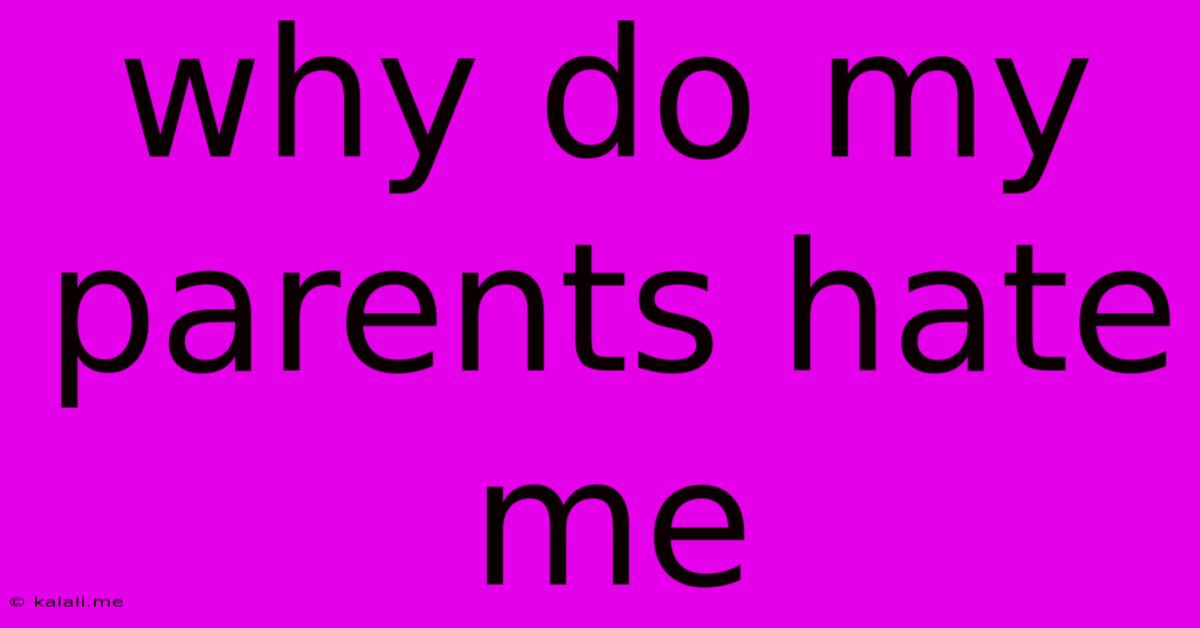Why Do My Parents Hate Me
Kalali
May 25, 2025 · 4 min read

Table of Contents
Why Do My Parents Hate Me? Navigating Difficult Family Dynamics
Feeling like your parents hate you is incredibly painful and can have a significant impact on your mental health and well-being. It's important to understand that this feeling, while intensely personal, doesn't necessarily reflect the full truth of the situation. Often, the reality is far more nuanced than a simple "hate" relationship. This article explores potential reasons behind this feeling and offers pathways towards understanding and potentially healing the relationship.
Understanding the Feeling: Before diving into potential causes, it's crucial to acknowledge that feeling unloved or unwanted by your parents is a valid and deeply distressing emotion. This feeling isn't about being dramatic or overly sensitive; it’s a genuine response to perceived rejection or lack of emotional support. This feeling can stem from various factors, and exploring these factors is the first step towards finding clarity and potential solutions.
Potential Reasons Behind Feeling Unloved:
-
Unrealistic Expectations: Parents, often unknowingly, can place immense pressure on their children to meet specific expectations. Academic success, career choices, relationship status – these areas can create a breeding ground for conflict if the child falls short of parental ideals. This pressure, while not necessarily rooted in hate, can manifest as criticism, disappointment, and ultimately, a feeling of being constantly judged and found wanting. This can be particularly challenging during adolescence and young adulthood.
-
Parental Mental Health Challenges: Untreated mental health issues like depression, anxiety, or substance abuse can significantly impact a parent's ability to express love and affection appropriately. A parent struggling with their own internal battles might withdraw emotionally, leading to children feeling neglected or unloved. This isn't a reflection of the child's worth; rather, it's a consequence of the parent's struggles.
-
Parenting Styles and Communication Issues: Different parenting styles can lead to vastly different childhood experiences. Authoritarian parenting, for instance, might foster a climate of fear and resentment, while emotionally unavailable parents might leave children feeling unheard and unseen. Poor communication skills further exacerbate this, leading to misunderstandings and unresolved conflicts that fester over time. Remember that poor communication isn't necessarily intentional; it could be a learned behavior or a result of other underlying factors.
-
Difficult Childhood Experiences: Parents who experienced trauma or neglect in their own childhoods might unintentionally replicate those patterns in their parenting. They may not know how to express love and affection in healthy ways, leading to children feeling emotionally neglected or even abused. This is complex and often requires professional intervention.
-
Unresolved Family Conflicts: Long-standing family tensions, rivalries, or unresolved traumas can significantly impact the dynamics within the family. A child might inadvertently become the focus of these conflicts, feeling like a scapegoat or an unwanted burden.
-
Differing Personalities and Values: Simple personality clashes can contribute to feelings of disconnect. If a parent and child have significantly different personalities or values, this can lead to frequent misunderstandings and conflicts. This doesn't mean there's hate involved; it just signifies a lack of compatibility in certain areas.
What to Do If You Feel This Way:
-
Seek Professional Help: A therapist can provide a safe space to process your feelings and develop coping strategies. Therapy can help you understand your family dynamics, develop healthier communication skills, and set boundaries.
-
Journaling: Writing down your thoughts and feelings can be a powerful tool for self-discovery and emotional regulation.
-
Focus on Self-Care: Prioritizing your mental and physical well-being is essential. Engage in activities that bring you joy and help you manage stress.
-
Build a Supportive Network: Surround yourself with supportive friends, family members, or mentors who can offer unconditional love and acceptance.
-
Manage Expectations: It's crucial to accept that you may not be able to change your parents' behavior. Focus on managing your expectations and focusing on creating a fulfilling life for yourself, regardless of your relationship with your parents.
Remember, feeling like your parents hate you is a complex emotion with potential roots in various family dynamics. Seeking help and focusing on self-care are crucial steps toward navigating these challenging feelings and building a healthier relationship with yourself and your family. You deserve to feel loved and supported.
Latest Posts
Latest Posts
-
Can A Jehovah Witness Marry Outside Their Religion
May 25, 2025
-
Coax Cable From Pole To House
May 25, 2025
-
Are You Sure You Want To Delete
May 25, 2025
-
What Was The Wickedness Of Nineveh
May 25, 2025
-
How To Connect 3 Wire Led Light To 2 Wire
May 25, 2025
Related Post
Thank you for visiting our website which covers about Why Do My Parents Hate Me . We hope the information provided has been useful to you. Feel free to contact us if you have any questions or need further assistance. See you next time and don't miss to bookmark.